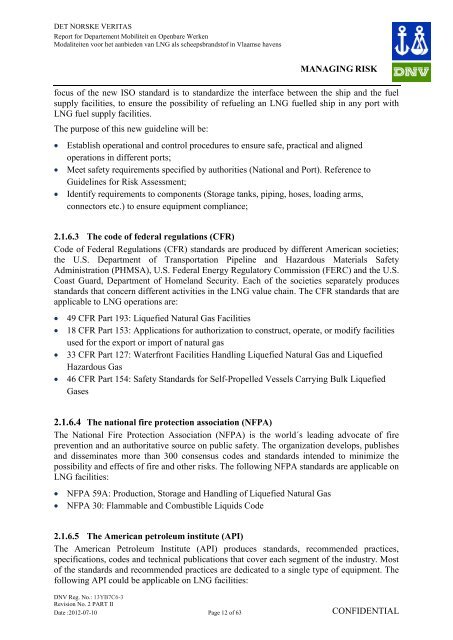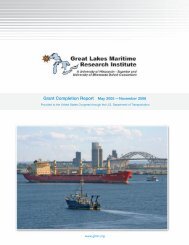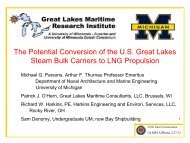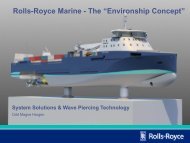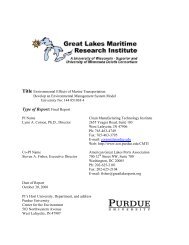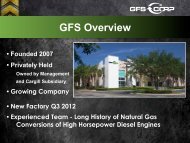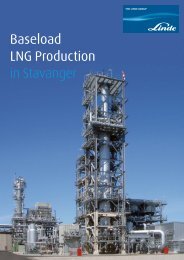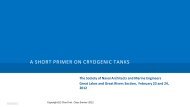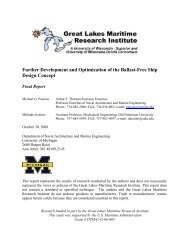Modalities for the provisioning of LNG as shipping fuel in Flemish Ports
Modalities for the provisioning of LNG as shipping fuel in Flemish Ports
Modalities for the provisioning of LNG as shipping fuel in Flemish Ports
You also want an ePaper? Increase the reach of your titles
YUMPU automatically turns print PDFs into web optimized ePapers that Google loves.
DET NORSKE VERITAS<br />
Report <strong>for</strong> Departement Mobiliteit en Openbare Werken<br />
Modaliteiten voor het aanbieden van <strong>LNG</strong> als scheepsbrandst<strong>of</strong> <strong>in</strong> Vlaamse havens<br />
MANAGING RISK<br />
focus <strong>of</strong> <strong>the</strong> new ISO standard is to standardize <strong>the</strong> <strong>in</strong>terface between <strong>the</strong> ship and <strong>the</strong> <strong>fuel</strong><br />
supply facilities, to ensure <strong>the</strong> possibility <strong>of</strong> re<strong>fuel</strong><strong>in</strong>g an <strong>LNG</strong> <strong>fuel</strong>led ship <strong>in</strong> any port with<br />
<strong>LNG</strong> <strong>fuel</strong> supply facilities.<br />
The purpose <strong>of</strong> this new guidel<strong>in</strong>e will be:<br />
Establish operational and control procedures to ensure safe, practical and aligned<br />
operations <strong>in</strong> different ports;<br />
Meet safety requirements specified by authorities (National and Port). Reference to<br />
Guidel<strong>in</strong>es <strong>for</strong> Risk Assessment;<br />
Identify requirements to components (Storage tanks, pip<strong>in</strong>g, hoses, load<strong>in</strong>g arms,<br />
connectors etc.) to ensure equipment compliance;<br />
2.1.6.3 The code <strong>of</strong> federal regulations (CFR)<br />
Code <strong>of</strong> Federal Regulations (CFR) standards are produced by different American societies;<br />
<strong>the</strong> U.S. Department <strong>of</strong> Transportation Pipel<strong>in</strong>e and Hazardous Materials Safety<br />
Adm<strong>in</strong>istration (PHMSA), U.S. Federal Energy Regulatory Commission (FERC) and <strong>the</strong> U.S.<br />
Co<strong>as</strong>t Guard, Department <strong>of</strong> Homeland Security. Each <strong>of</strong> <strong>the</strong> societies separately produces<br />
standards that concern different activities <strong>in</strong> <strong>the</strong> <strong>LNG</strong> value cha<strong>in</strong>. The CFR standards that are<br />
applicable to <strong>LNG</strong> operations are:<br />
49 CFR Part 193: Liquefied Natural G<strong>as</strong> Facilities<br />
18 CFR Part 153: Applications <strong>for</strong> authorization to construct, operate, or modify facilities<br />
used <strong>for</strong> <strong>the</strong> export or import <strong>of</strong> natural g<strong>as</strong><br />
33 CFR Part 127: Waterfront Facilities Handl<strong>in</strong>g Liquefied Natural G<strong>as</strong> and Liquefied<br />
Hazardous G<strong>as</strong><br />
46 CFR Part 154: Safety Standards <strong>for</strong> Self-Propelled Vessels Carry<strong>in</strong>g Bulk Liquefied<br />
G<strong>as</strong>es<br />
2.1.6.4 The national fire protection <strong>as</strong>sociation (NFPA)<br />
The National Fire Protection Association (NFPA) is <strong>the</strong> world´s lead<strong>in</strong>g advocate <strong>of</strong> fire<br />
prevention and an authoritative source on public safety. The organization develops, publishes<br />
and dissem<strong>in</strong>ates more than 300 consensus codes and standards <strong>in</strong>tended to m<strong>in</strong>imize <strong>the</strong><br />
possibility and effects <strong>of</strong> fire and o<strong>the</strong>r risks. The follow<strong>in</strong>g NFPA standards are applicable on<br />
<strong>LNG</strong> facilities:<br />
NFPA 59A: Production, Storage and Handl<strong>in</strong>g <strong>of</strong> Liquefied Natural G<strong>as</strong><br />
NFPA 30: Flammable and Combustible Liquids Code<br />
2.1.6.5 The American petroleum <strong>in</strong>stitute (API)<br />
The American Petroleum Institute (API) produces standards, recommended practices,<br />
specifications, codes and technical publications that cover each segment <strong>of</strong> <strong>the</strong> <strong>in</strong>dustry. Most<br />
<strong>of</strong> <strong>the</strong> standards and recommended practices are dedicated to a s<strong>in</strong>gle type <strong>of</strong> equipment. The<br />
follow<strong>in</strong>g API could be applicable on <strong>LNG</strong> facilities:<br />
DNV Reg. No.: 13YB7C6-3<br />
Revision No. 2 PART II<br />
Date :2012-07-10 Page 12 <strong>of</strong> 63 CONFIDENTIAL


